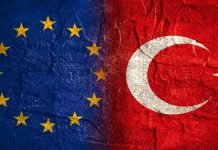The governor of İstanbul’s Gaziosmanpaşa district yesterday prohibited the staging of a theater play in Kurdish just hours before the performance was scheduled to begin, Turkish media reported.
“Bêrû” was to be staged in a theater owned by the İstanbul Metropolitan Municipality. The Kurdish theater group, Teatra Jiyana Nû, announced the ban from their Twitter account by posting the official notice, which stated that the reason for the decision was “maintaining public safety and well-being.”
According to the Duvar daily, the police raided the theater where the play was to be staged and tried to force the actors to sign the official notice. The actors allegedly resisted signing the document.
The general director of the City Theaters of the İstanbul Metropolitan Municipality, Ceyhun Ünlü, said art in Turkey would be free one day. “This kind of suppression does not mean we will be silent. We will not change our perspective.”
“Bêrû” is a Kurdish adaptation of Nobel laureate Dario Fo’s play, “Trumpets and Raspberries.” According to the Deutsche Welle Turkish service website, it was to be the first Kurdish play performed at the City Theaters since its establishment 106 years ago.
“Tiyatromuz Yaşasın İnsiyatifi,” an initiative to support Turkish theater, said the play had been staged many times and positively received. “This is a satirical play that deals with the state’s inner conflicts. Forbidding it shows that authorities are afraid of the theater’s potential to raise awareness among people.”
Meral Danış Beştaş, deputy chair of the pro-Kurdish Peoples’ Democratic Party’s (HDP) parliamentary group, protested the decision, saying: “They said a play staged in the Kurdish language has the potential to disrupt public well-being and safety. On the contrary, banning a language spoken by millions of citizens is a disruption of public safety and well-being.”
İstanbul Governor Ali Yerlikaya tweeted that the play was not canceled because it was in Kurdish but because it disseminated propaganda for the Kurdistan Workers’ Party (PKK). He added that legal proceedings had been initiated.
Deputy Interior Minister İsmail Çataklı said theater in the Kurdish language was permitted but that the play was blatant propaganda for the PKK.
The PKK is an armed secessionist group considered a terrorist organization by the United States, Turkey and the European Union.
Prohibitions against the use of Kurdish in Turkey go back many years. Kurdish language, clothing, folklore and names had been banned since 1937. The words “Kurds,” “Kurdistan” and “Kurdish” were among those officially prohibited. After a military coup in 1980, speaking Kurdish was officially forbidden even in private life.
Many people who spoke, broadcast or sang in Kurdish were imprisoned. The ban officially continued until 1991. Kurds continue their struggle for Kurdish education in schools in the regions where they live. Between 2010 and 2014, when an attempt was made to solve Turkey’s Kurdish problem by means of an official “peace process,” lectures were given in Kurdish in some schools, and Kurdish signs were installed in the cities. These rights were taken back after the failure of the peace talks.















